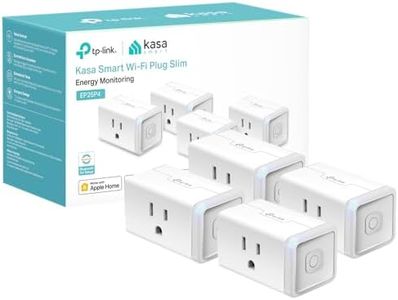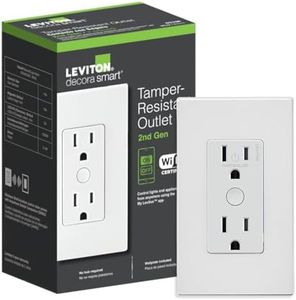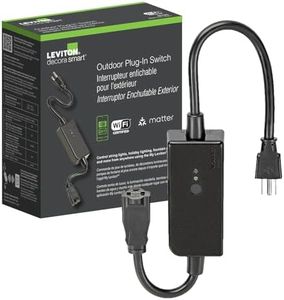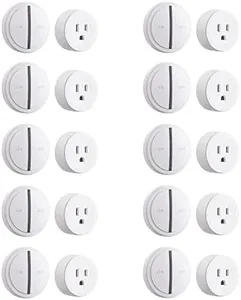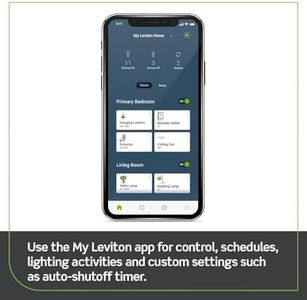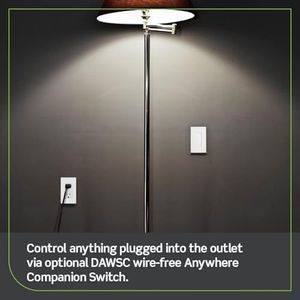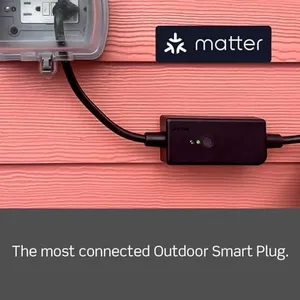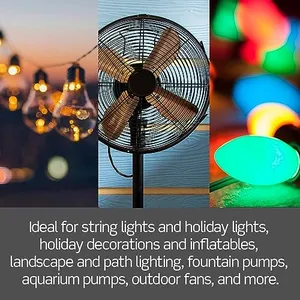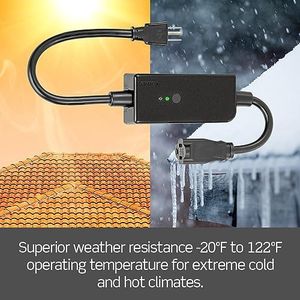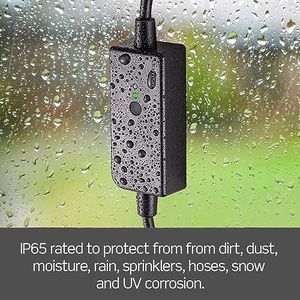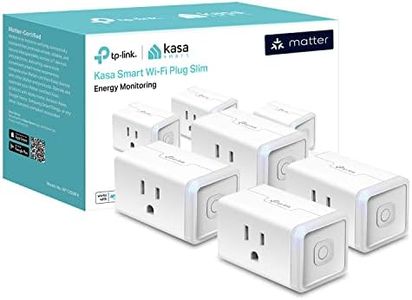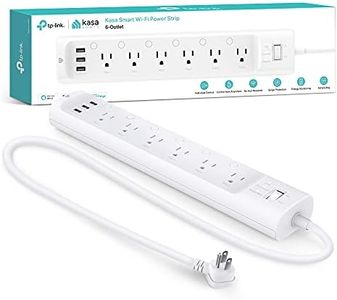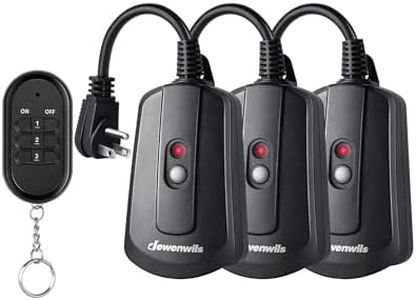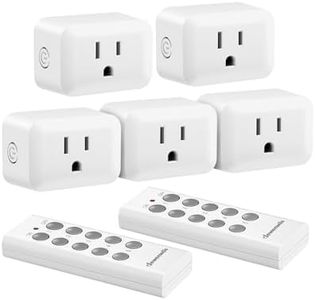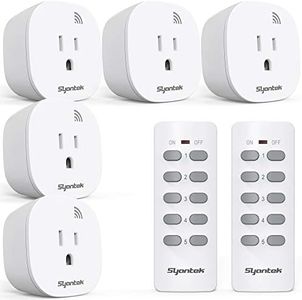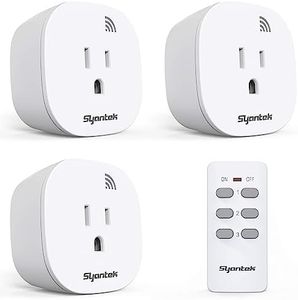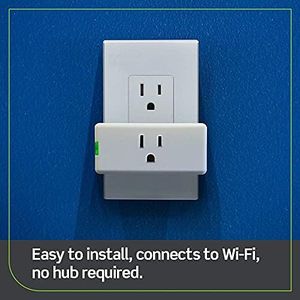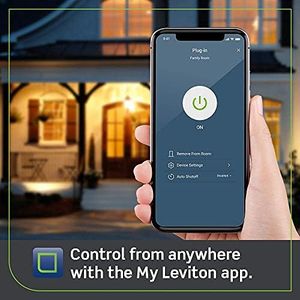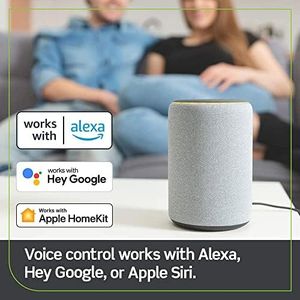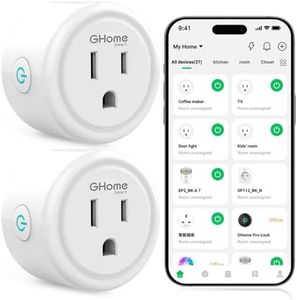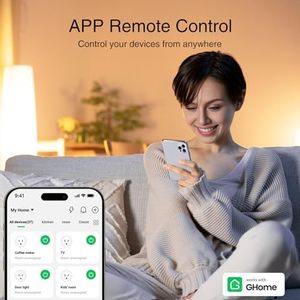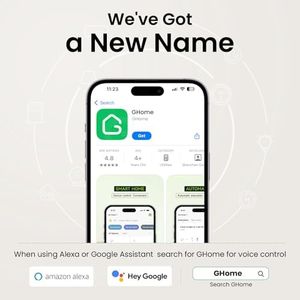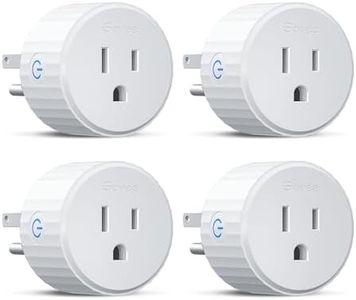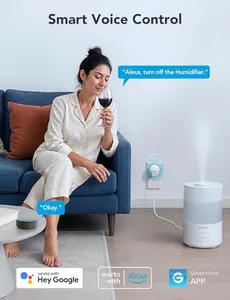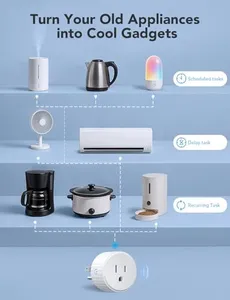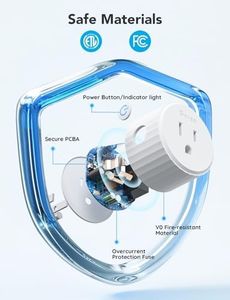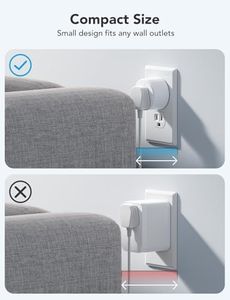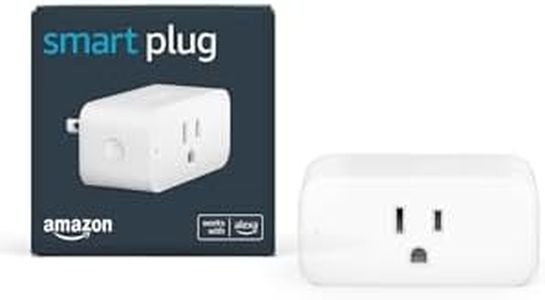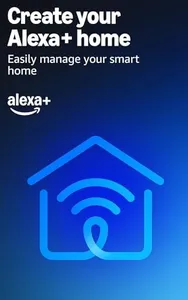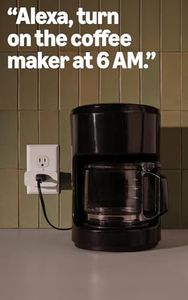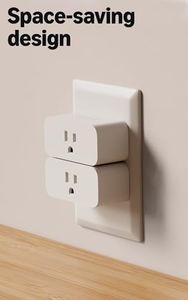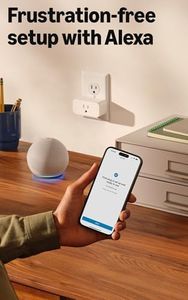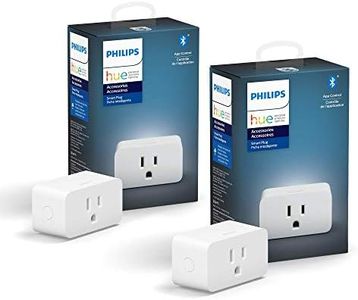10 Best Smart Plugs 2026 in the United States
Winner
Kasa Smart Plug Mini 15A, Apple HomeKit Supported, Smart Outlet Works with Siri, Alexa & Google Home, UL Certified, App Control, Scheduling, Timer, 2.4G WiFi Only, 4 Count (Pack of 1) (EP25P4), White
The Kasa Smart Plug Mini 15A is a solid choice for anyone looking to add smart capabilities to their home. Its compatibility with Apple HomeKit, Alexa, and Google Home makes it versatile for users already in any of these ecosystems. You can easily control devices through voice commands or the Kasa app, which is user-friendly and straightforward, making it ideal for those who may not be very tech-savvy. The energy monitoring feature is particularly handy, allowing you to keep an eye on power consumption, which can help save on electricity bills.
Most important from
26603 reviews
Leviton Decora Smart Outlet, Tamper-Resistant 15A, Wi-Fi 2nd Gen, Works with My Leviton, Alexa, Google Assistant, Apple Home/Siri & Wire-Free Companions for Switched Outlet, D215R-1RW, White
The Leviton Decora Smart Outlet is a solid choice if you want reliable smart plug control without adding a hub. It connects directly via Wi-Fi and is compatible with popular voice assistants like Alexa, Google Assistant, and Apple HomeKit, making voice and app control straightforward. Scheduling features let you automate your devices based on time or sunrise/sunset, and vacation modes add extra convenience by randomizing on/off times.
Most important from
1146 reviews
Leviton Decora Smart Wi-Fi Outdoor Plug, Works with Matter, My Leviton, Alexa, Google Assistant, Apple Home/Siri & Wire-Free Anywhere Switch Companion, Weather-Resistant, D215O-1RE, Black
The Leviton Decora Smart Wi-Fi Outdoor Plug is a reliable option for controlling outdoor electronics such as holiday lights, pumps, and fans. It supports a strong 15 Amp load capacity suitable for most small appliances and has an IP65 weather resistance rating, allowing it to withstand rain, dust, snow, and UV exposure. This durability makes it suitable for various climates with temperatures ranging from -20°F to 122°F.
Most important from
1146 reviews
Top 10 Best Smart Plugs 2026 in the United States
Winner
Kasa Smart Plug Mini 15A, Apple HomeKit Supported, Smart Outlet Works with Siri, Alexa & Google Home, UL Certified, App Control, Scheduling, Timer, 2.4G WiFi Only, 4 Count (Pack of 1) (EP25P4), White
Kasa Smart Plug Mini 15A, Apple HomeKit Supported, Smart Outlet Works with Siri, Alexa & Google Home, UL Certified, App Control, Scheduling, Timer, 2.4G WiFi Only, 4 Count (Pack of 1) (EP25P4), White
Chosen by 1427 this week
Leviton Decora Smart Outlet, Tamper-Resistant 15A, Wi-Fi 2nd Gen, Works with My Leviton, Alexa, Google Assistant, Apple Home/Siri & Wire-Free Companions for Switched Outlet, D215R-1RW, White
Leviton Decora Smart Outlet, Tamper-Resistant 15A, Wi-Fi 2nd Gen, Works with My Leviton, Alexa, Google Assistant, Apple Home/Siri & Wire-Free Companions for Switched Outlet, D215R-1RW, White
Leviton Decora Smart Wi-Fi Outdoor Plug, Works with Matter, My Leviton, Alexa, Google Assistant, Apple Home/Siri & Wire-Free Anywhere Switch Companion, Weather-Resistant, D215O-1RE, Black
Leviton Decora Smart Wi-Fi Outdoor Plug, Works with Matter, My Leviton, Alexa, Google Assistant, Apple Home/Siri & Wire-Free Anywhere Switch Companion, Weather-Resistant, D215O-1RE, Black
Kasa Matter Smart Plug w/ Energy Monitoring, Compact Design, 15A/1800W Max, Super Easy Setup, Works with Apple Home, Alexa & Google Home, UL Certified, 2.4G Wi-Fi Only, White, KP125M (4-Pack)
Kasa Matter Smart Plug w/ Energy Monitoring, Compact Design, 15A/1800W Max, Super Easy Setup, Works with Apple Home, Alexa & Google Home, UL Certified, 2.4G Wi-Fi Only, White, KP125M (4-Pack)
Kasa Smart Plug Power Strip HS300, Surge Protector with 6 Individually Controlled Smart Outlets and 3 USB Ports, Works with Alexa & Google Home, No Hub Required , White
Kasa Smart Plug Power Strip HS300, Surge Protector with 6 Individually Controlled Smart Outlets and 3 USB Ports, Works with Alexa & Google Home, No Hub Required , White
Leviton Decora Smart Plug, Wi-Fi 2nd Gen, Works with Matter, My Leviton, Alexa, Google Assistant, Apple Home/Siri & Wire-Free Anywhere Companions for Switched Outlet, D215P-1RW, White
Leviton Decora Smart Plug, Wi-Fi 2nd Gen, Works with Matter, My Leviton, Alexa, Google Assistant, Apple Home/Siri & Wire-Free Anywhere Companions for Switched Outlet, D215P-1RW, White
Govee Smart Plug, WiFi Plugs Work with Alexa & Google Assistant, Smart Outlet with Timer & Group Controller, WiFi Outlet for Home, No Hub Required, ETL & FCC Certified, 2.4G WiFi Only, 4 Pack
Govee Smart Plug, WiFi Plugs Work with Alexa & Google Assistant, Smart Outlet with Timer & Group Controller, WiFi Outlet for Home, No Hub Required, ETL & FCC Certified, 2.4G WiFi Only, 4 Pack
Amazon Smart Plug | Works with Alexa | Simple setup, endless possibilities
Amazon Smart Plug | Works with Alexa | Simple setup, endless possibilities
Our technology thoroughly searches through the online shopping world, reviewing hundreds of sites. We then process and analyze this information, updating in real-time to bring you the latest top-rated products. This way, you always get the best and most current options available.

